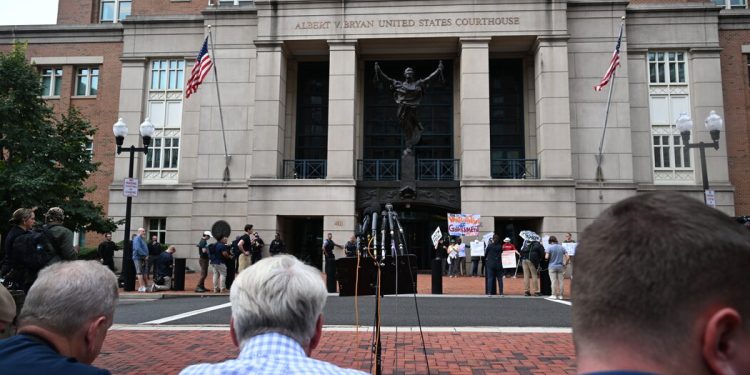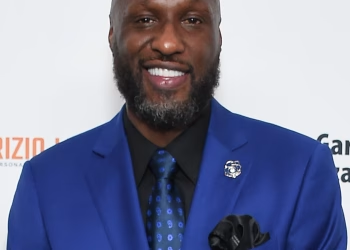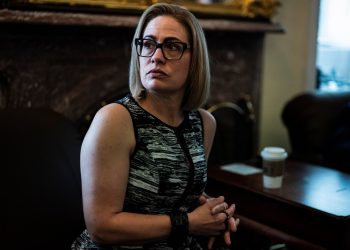A lawyer for James B. Comey, the former FBI director, said at his arraignment Wednesday that the defense team intends to file two motions to dismiss the case against him before it goes to trial.
Attorney Patrick J. Fitzgerald — himself a former top Justice Department prosecutor — said the defense would accuse the Trump administration of abusing prosecutorial power and raise a technical challenge to the legitimacy of the prosecutor appointed by President Trump to bring the case, Lindsey Halligan.
Here’s a closer look at these types of challenges.
What is the allegation of abuse of prosecutorial power?
One of the motions to dismiss the case that Comey’s defense team intended to present, Mr. Fitzgerald said, would be based on the claim that the charges amounted to “vindictive prosecutions” and “selective and retaliatory prosecutions under the direction of President Trump to silence” Mr. Comey.
These are closely related concepts involving an abuse of prosecutorial power in violation of the constitutional guarantee that everyone is entitled to due process and equal protection under the law.
What is a vindictive lawsuit?
This is a type of prosecutorial misconduct that involves bringing charges for inappropriate reasons, such as retaliation for the exercise of constitutional rights. The idea is that such a case would violate the defendant’s right to due process under the law.
Legal experts say it’s not enough to show that prosecutors focused on a particular person, because there are many examples of special counsel being assigned to investigate and charge a particular case. The defense would have to demonstrate that the reason prosecutors focused on Mr. Comey was something like retaliation for the exercise of his constitutional rights.
Mr. Trump has long attacked Mr. Comey, whom he fired as FBI director in 2017 amid the Russia investigation, and presented him as an adversary. Mr. Comey has frequently criticized Mr. Trump. Mr. Fitzgerald’s mention of Mr. Trump’s attempt to “silencing” Mr. Comey suggested that he would argue that Mr. Comey was being retaliated against for exercising his First Amendment rights.
What is selective prosecution?
This is a type of prosecutorial misconduct that involves targeting a single person when other people who have committed similar offenses are not charged. The idea is that such a case would violate a defendant’s right to equal protection under the law.
A defendant would have to demonstrate that the same prosecutor’s office — here, the U.S. Attorney for the Eastern District of Virginia — reviewed other cases identical to Mr. Comey’s and decided not to file charges, and that the reason for the difference was discrimination based on a constitutionally protected characteristic.
Specifically, the Supreme Court said that selective prosecutions violate the Equal Protection Clause if the reason a defendant is treated differently from others who may be charged is “deliberately based on an unjustifiable standard such as race, religion, or other arbitrary classification.”
“There’s an interesting question about whether Trump’s opponents constitute a political class protected from selective prosecution,” said David A. Sklansky, a criminal law professor at Stanford University. “I think it would.”
He pointed to a 1985 case in which a defendant claimed he was accused of exercising his First Amendment right to protest military drafting. In that case, a federal district judge agreed and dismissed the charge. But the Supreme Court later ruled that the case could go forward because the accused had not proven that he had been singled out “because of his protest activities.”
What are Comey’s chances of winning?
Defendants in politically high-profile cases often raise such allegations, but they rarely succeed. One reason is that in the U.S. justice system, prosecutors have broad discretion in choosing how to handle a criminal case, whether that means choosing more or less severe charges, entering into a plea deal, or not filing any charges at all.
Samuel W. Buell, a criminal law professor at Duke University, said courts defer to the executive branch on charges, and cases of dismissal of an indictment for wrongful charging decisions “are so rare that it’s almost impossible to find one.”
But, he said, the situation surrounding Mr. Comey’s indictment was so unusual that he might have a chance.
Mr. Trump pushed Attorney General Pam Bondi to accuse Mr. Comey of lying under oath as the five-year statute of limitations was about to expire for making accusations about his congressional testimony. When the previous acting U.S. Attorney, Erik S. Siebert, refused to seek indictments because he considered the available evidence too weak, Mr. Trump forced him out and installed Ms. Halligan, a former personal lawyer who had never prosecuted, in his place. She asked a grand jury to indict him.
“It’s extremely difficult to make this type of claim to justify dismissing an indictment before trial, but the sequence of events here as to how this played out with the statute of limitations looming is so extraordinary that it could be the case when vindictive prosecutions work,” Professor Buell said. “The results are very bad for the government.”
What is the illegal appointment claim?
Mr. Fitzgerald also said he intended to file a motion to dismiss the case on the grounds that Ms. Halligan’s appointment as U.S. attorney was illegal.
This is a technical argument that is not about the merits of the accusations or the motivation behind them, but about whether she had the legitimate authority to ask a grand jury to indict Mr. Comey. If she did not do so, a judge could then dismiss the indictment.
What are the circumstances of Halligan’s appointment?
Normally, the position of U.S. attorney is confirmed by the Senate. When a position needs to be temporarily filled, the default is that the No. 2 official in the office serves as acting U.S. attorney until the Senate confirms a new appointment. But federal law also allows an administration to assign this role to someone else, with certain limits.
One mechanism, which appears to be how Ms. Halligan was installed, is a law that allows the attorney general to appoint an “acting” U.S. attorney for up to 120 days. The law states that when that term expires, a federal court decides who to appoint as the next interim, until the Senate confirms someone for the role.
Using this mechanism allows a president to simultaneously appoint this official to serve in this position on a permanent basis. Mr. Trump nominated Ms. Halligan for the role.
But Ms. Bondi had previously appointed Mr. Siebert as acting U.S. attorney, and after serving that 120-day term, a federal court appointed him as U.S. attorney.
The question is how to interpret Mr. Siebert’s departure — as creating a new vacancy, starting the cycle again so that Ms. Bondi can appoint a new acting U.S. attorney, or as part of the same sequence, so that she probably cannot do so, said Anne Joseph O’Connell, a law professor at Stanford University who has written extensively about acting officials.
She said there is no definitive legal precedent on how to interpret the U.S. attorney’s interim status.
In 1986, after the Interim U.S. Attorneys Act was signed into law, Samuel A. Alito Jr.—then a Reagan administration attorney in the Justice Department’s Office of Legal Counsel—wrote that Congress seemed to want a system in which, after the expiration of a 120-day acting appointment, any “additional acting appointments would be made by the court rather than by the Attorney General.”
What happens if the indictment is dismissed?
He’s probably dead. One reason Mr. Trump was apparently trying so hard to get someone to ask a grand jury to indict Mr. Comey for his September 2020 testimony was that the five-year statute of limitations for accusing him of lying to Congress was about to expire.
This deadline having now passed, it would be difficult to restart the proceedings against him with a new indictment. Prosecutors are expected to find more recent action and then describe the sequence as some kind of ongoing plot by Mr. Comey to lie to Congress.
Notably, even the charge against Mr. Comey was something of a bank hit to get around an expired statute of limitations. Mr. Comey is charged with saying in 2020 that he stood by something he said during his testimony in 2017, for which the deadline to charge him had long passed.
Minho Kim contributed reporting from Alexandria, Virginia.









